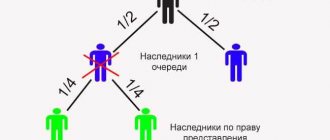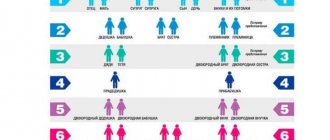Inheritance by will has not yet become an everyday reality in Russia. If the inheritance is “ordinary” - an apartment, a dacha, a car, and so on, people usually “don’t bother” to distribute it all among the heirs. They say they will figure it out themselves.
Whether this is good or bad is not the point. “Fights at the coffin” happen regardless of whether property is distributed by will or law. It all depends on family relationships. The fact is that inheritance by law is the most common method in our country. Let's discuss it.
So, the basic principles of legal inheritance are as follows:
- Marital and family relationships are a priority
- The law defines an exhaustive circle of heirs - 7 lines
- Norms and rules determine the conditions for the transfer of inheritance rights sequentially from one queue to another
- Representatives of one line divide the inherited property equally among themselves (there are exceptions in cases of application of the right of representation)
Let's find out how these principles are implemented in practice.
Order of heirs
Stage II siblings of the deceased (full and half-blood), parents of parents (grandparents)
| Stage I | parents, spouses, children (adopted and foster children are treated as blood) |
| Stage III | siblings of the deceased's parents (aunts and uncles) |
| Queue IV | great-grandparents (third degree of relationship) |
| Queue V | siblings of grandparents (older cousins), children of nephews and nieces, they are also cousins (fourth degree of kinship) |
| Queue VI | fifth degree of kinship, cousins: uncles, aunts, nephews, nieces, great-grandchildren, great-granddaughters, their descendants (by nomination). This is the last line of blood relatives. |
| Queue VII | stepfather, stepmother, unadopted children of spouses from other marriages (stepsons and stepdaughters) |
There is another special category of heirs, prescribed in Article 1148 of the Civil Code of the Russian Federation.
We are talking about disabled dependents who lived at the expense of the testator until his death and at least a year before that. If there are no successive heirs, they are considered the 8th line receiving inheritance rights. If there are heirs of previous queues, the category of disabled dependents inherits on an equal basis with the queue called for inheritance.
Deadline for inheritance according to law
Entering into inheritance rights presupposes the heir taking active actions aimed at expressing his will, acquiring a certain amount of inherited property and the property obligations of the deceased. As is known, the commission of such active actions (Article 1153 of the Civil Code) is permissible within a certain period, which is called the period of entry into inheritance .
Attention
According to paragraph 1 of Art. 1154 of the Civil Code, the majority of heirs must enter into inheritance within 6 months from the moment when the specified inheritance mass is opened. Provisions of Art. 1114 of the Civil Code defines 3 possible moments for opening an inheritance - the day of death of the testator, the day the court decision declaring him dead comes into force and the day of the expected death of the citizen, established by the court.
However, if the inheritance is opened on the day of the expected death, the period for entering into the inheritance begins to run from the moment the decision determining such day comes into force (clause 1 of Article 1154 of the Civil Code). Other special deadlines for entering into inheritance rights include:
- A special six-month period for persons whose inheritance rights arose as a result of the refusal of other legal successors to receive an inheritance (Article 1157, Article 1158 of the Civil Code) or their exclusion from inheritance as unworthy (Article 1117 of the Civil Code). The specified period begins from the moment the specified right arises.
- A special three-month period for persons whose right of inheritance arose as a result of non-acceptance of the inheritance by other heirs (clause 3 of Article 1154 of the Civil Code). The three-month period provided for them begins from the moment of expiration of the total period (6 months).
- A special six-month period for newborn heirs born after the death of the testator, but conceived during his lifetime . Based on the provisions of Art. 1116 of the Civil Code, the course of the special period established for them begins from the moment the inheritance rights arise, and therefore, from the moment of their birth.
- Special period for persons receiving inheritance by way of transmission . According to Art. 1156 of the Civil Code, they have the right to enter into an inheritance within the period provided for the main legal successor, from whom all rights were transferred to them. If such remaining period is less than three months, it shall be extended to three months.
According to Art. 1155 of the Civil Code, if the above deadlines are missed, they can be restored both in court and through conciliation . Thus, the conciliation form presupposes the presence of written consent to restore the term from all other heirs who have already entered into the inheritance. The judicial procedure will be relevant in the case of valid reasons for absence, as well as in the case of going to court, until the expiration of a six-month period from the moment the specified reasons disappear.
Transfer of inheritance rights from one queue to another
The transition through queues is regulated by Articles 1113 and 1114 of the Civil Code of the Russian Federation. The queues of heirs successively replace each other if:
- It is notarized that there are no priority heirs. For example, if the parents and spouse have already died and there were no children
- Representatives of the previous line do not have the right of inheritance. In particular, parents who have been deprived of parental rights. Or representatives of the current queue are recognized as “unworthy heirs” through the court. This can happen if they are proven to have maliciously evaded the maintenance of a disabled testator, caused physical or moral harm to him, etc.
- All representatives of the previous line signed a waiver of inheritance
- No one from the previous line reported their readiness to enter into inheritance rights within the period established by law
If at least one of the circumstances is present, the right of inheritance goes down the line” - passes to representatives of the next category.
The heir is the spouse of the deceased
The spouse who was officially married to the deceased can enter into inheritance. If the couple divorced on the day of the testator's death, the divorced spouse does not have the right to claim first priority.
It is also necessary to raise the issue of jointly acquired property. If one of the spouses in the family dies, the property share of each of them is determined. Property that belongs to a living spouse is not divided among heirs. This process is called allocation of a share of property.
The allocation of a share does not require legal proceedings. The living spouse must provide notaries with documents that confirm ownership of specific property (this could even be receipts for payment for expensive repairs to a shared apartment).
Who inherits first?
Closest people: children, parents, husband or wife. The property of the deceased is divided equally between them.
ATTENTION! One clarification should be made regarding the rights of spouses. There is a legal concept of joint property of spouses. That is, not all of the testator’s property is considered his personal property. Half belongs to the husband or wife. Therefore, first, half of the marital share is allocated, and the rest is divided among all first-degree heirs, including the spouse. That is, in practice, the husband or wife receives a larger share of the inheritance than children and parents.
However, in order to inherit from each other, spouses must have a legally registered relationship.
If at the time of the death of one of them, the marriage is legally dissolved, the second spouse is deprived of the right to inherit, even in the case of actually living together and running a joint household.
The only exceptions are cases where the undocumented spouse can be considered a disabled dependent. But the “married half” is not allocated, and the share will be lower.
Parents inherit if they are not deprived of parental rights (an exception, again, may be if the disabled parent is dependent on the deceased). Adoptive parents are equal in law to natural parents.
Children have equal rights to the parent's inheritance. It doesn’t matter if they were born in a current marriage, in a previous marriage, or out of wedlock.
Even if at one time the testator was deprived of parental rights to one of the children, the latter still has the right to inherit, along with the others.
If the testator's children died before him, the right of inheritance passes to their children (grandchildren of the deceased) through the right of representation.
How is an inheritance formalized?
In order to register an inheritance, lawyers recommend using the following algorithm of actions.
Step 1. Determine the place of opening of the inheritance.
This place is the place of residence of the testator before his death. As a rule, this is the registered address of the testator. If the deceased does not have registration, the inheritance case will be opened where most of the inherited property is located, in particular real estate. It is possible to document the place of opening of the inheritance by submitting a certificate of the last place of residence of the deceased, an extract from his house register, or an extract from the Unified Register of Real Estate Rights.
Step 2. Collect documents that allow you to enter into an inheritance according to the law.
Such documents include:
- death certificate;
- certificate from the last place of residence of the testator;
- documents confirming relationship (birth certificate, adoption certificate, marriage certificate, etc.);
- title documents for inherited property, including movable and immovable.
Step 3. Contact a notary with an application to accept the inheritance. The above documents must be attached to this application.
If the heir does not have the opportunity to submit an application in person, he can use postal services and send the application by mail. A prerequisite is the notarization of the signature on the application, or it can be certified by an authorized official (the head physician of a medical institution, the head of a military hospital, the captain of a ship, etc.).
The application can be drawn up in any form, but it must necessarily include the following information:
- first name, surname, patronymic of the heir and testator;
- date of death and last place of residence (registration) of the testator;
- confirmation of the heir’s readiness to enter into inheritance;
- the reasons for this (family or marital ties);
- date of application.
Step 4. Pay the state fee and submit the corresponding receipt to the notary.
The heirs will have to pay a state fee in the following amount for issuing a certificate of inheritance according to the law:
- 0.3% of the value of the inherited property is paid by the children, spouse, parents, brothers and sisters of the testator;
- Other heirs pay 0.6% of the value of the inherited property.
Step 5. Obtaining a certificate of inheritance.
There is a certain period for filing an application - six months from the date of death of the testator, but for obtaining a certificate of the right to inheritance there are no specific deadlines provided by law, i.e. it can be obtained after the six-month period at any time.
According to the norms of current legislation, rights to certain types of inherited property are subject to mandatory state registration. So, heirs who inherited real estate, land plots, and vehicles must apply to the relevant authorities for state registration.
Second stage
Next come the grandparents and siblings of the testator.
Siblings are all children of the same parents. The right of inheritance is enjoyed by both full-born (siblings) and half-born (half- or uterine) siblings who have a different father or mother.
ATTENTION! The main basis for second-order inheritance is family ties. Half-brothers and sisters (if the parents marry having children from previous marriages) are legal heirs only if adopted by the parent for whom they were not relatives. In this case, the family relationship is replaced by a legal one. Officially, non-adopted half-siblings do not have the right to inherit from each other.
The same goes for grandparents. If they were not the blood parents of the testator’s father or mother, they will be second-order heirs only if they are officially adopted.
If the brothers and sisters have already died, the inheritance passes to their children by right of representation.
Unworthy heirs
Unworthy heirs include citizens who do not have the right to claim their rights to inheritance after the death of the testator.
These can be divided into three main categories:
- Unworthy heirs, which include citizens who tried to illegally take possession of the inheritance. These persons will not be able to inherit either by law or by will. This group of people, through their illegal actions, prevented other heirs from receiving the inheritance, arbitrarily changed the share of the inheritance, or attempted to otherwise change the will of the testator. These facts are proven in court proceedings;
- Parents deprived of their parental rights do not have the right to inherit the property of their deceased children;
- Persons deprived of the right to receive inheritance by law. This right can be deprived of the heir only by a court decision if a claim is filed by interested parties who are involved in the inheritance process. The basis on which in this case the deprivation of inheritance will be carried out will be the heirs’ malicious evasion from fulfilling their obligations to support the testator.
How to enter into an inheritance after a person’s death?
How to enter into an inheritance without a will, read here.
How to enter into an inheritance under a will, read the link:
At the same time, these persons will still be able to receive an inheritance in the case where the testator bequeathed property to heirs who were not entitled to this inheritance.
Do not forget! The rules on unworthy heirs are subject to application, including to persons who are entitled to an obligatory share in the inheritance - in the event that they are recognized as unworthy heirs, then, accordingly, they will not be able to receive the testator’s property as an inheritance.
In addition, the descendants of unworthy heirs will not be able to inherit by right of representation.
Conditions for inheritance by dependents
The very fact that the dependent was supported by the testator must be proven. The following documents are required:
- Documentary evidence of incapacity for work (pension certificate, disability certificate)
- Documentary proof of residence with the testator (if the dependent is not a relative or a relative so distant that he is not included in any line, it is also necessary to prove that he lived with the testator for a year or more, until the day of his death)
Lawyer's answers to private questions
Can I enter into an inheritance after 6 months if I did not know about the death of the testator?
The law allows for the restoration of the missed period if the heir confirms that he did not know and could not know about the death of the testator. Confirmation will be residence in another region, lack of contact with the deceased or other relatives. To recover, you must file a claim in court.
Can a minor inherit an inheritance on a first-come, first-served basis?
Yes, age does not affect the possibility of receiving inherited property. The interests of the minor are represented by parents/guardians. Additionally, a minor heir is deprived of the obligation to pay state fees.
I live in another city, I can’t come. How can I inherit?
A legal representative acting on the basis of a notarized power of attorney can be involved in the process. A power of attorney is drawn up, giving the right to represent the interests of the heir in enforcement proceedings. This method is available even when receiving an inheritance outside of Russia.
Right of representation
When people first read the list of inheritance queues, they are often perplexed: “How can this be, where are the grandchildren? And why are there aunts and uncles, but no cousins in any of the queues?
This is due to the concept of the right of representation. In essence and logic, grandchildren are heirs “directly,” that is, in the first place. But only after the inheritance passes successively to the children and then to the grandchildren. Grandchildren can inherit directly from their grandparents only if their parent-heir died before receiving the inheritance from their parents.
The same applies to the children of the testator's siblings. Nieces and nephews become second-degree heirs if the siblings predecease the testator. This is the right of representation.
The inheritance share by right of representation corresponds to the share that the original heir would have received. That is, two grandchildren will share the share of their father or mother, and three nephews will share the share of the testator’s sibling. However, the only heir by right of representation receives exactly the same share as the share of the other heirs of the given order.
This procedure for the right of representation applies to all related queues. In the 6th line, this could be the grandson of a cousin's grandson or the great-granddaughter of a great-aunt.
Refusal of inheritance by law
The provisions of Art. 1157 of the Civil Code, the legislator determined an additional power of potential heirs under the law - the possibility of refusing to receive an inheritance. It is noteworthy that such a refusal can be made by a successor both in relation to any other heir under a will or law, regardless of the order (clause 1 of Article 1158 of the Civil Code), and without indicating the person in whose favor such a refusal was made.
For your information
However, according to the Resolution of the Constitutional Court of the Russian Federation dated December 23, 2013 No. 29-P, clause 1 of Art. 1158 of the Civil Code does not allow one to unambiguously determine the list of persons in whose favor such a directed refusal can be made.
Based on this, different approaches to law enforcement practice are possible, which may unreasonably exclude some persons from the circle of heirs under the law, which is why this provision was recognized as inconsistent with the Constitution of the Russian Federation, and therefore, in this part has lost force.
Refusal of inheritance is an expression of the will of the potential successor, aimed at the reluctance to acquire all the inheritance rights and obligations due to him, based on which, it should be considered a unilateral transaction . This procedure requires compliance with a lot of features, including:
- Both directed and ordinary refusals of inheritance are made in writing and submitted to the notary who conducts the inheritance case at the place where the inheritance was opened. Refusal, in accordance with paragraph 2 of Art. 1157 of the Civil Code, can be committed during the period provided for acceptance of the inheritance, including after such acceptance.
- In the case where there is actual possession of the inherited property, refusal of the inheritance in court is also permissible after the expiration of the period provided for that time, but only if the reasons for missing the deadline for refusal are recognized as valid.
- According to paragraph 2 of Art. 1158 of the Civil Code, refusal of inheritance made with reservations or under suspensive and disqualifying conditions . Moreover, according to paragraph 3 of Art. 1157 of the Civil Code, the refusal cannot subsequently be withdrawn or changed in any way. Refusal of an inheritance is unconditional and irrevocable - the inheritance cannot be accepted again by the successor after its renunciation.
- In order to protect the legitimate interests of incapacitated people, limited in legal capacity and minors, refusal of inheritance on their behalf must be previously agreed upon with the guardianship and trusteeship authorities . In addition, refusal of the obligatory share in the inheritance (clause 1 of Article 1158 of the Civil Code) or the part due to the successor of the share (clause 3 of Article 1158 of the Civil Code) is unacceptable.
Is inheritance possible by law in the presence of a will?
Yes, this is not excluded even if there is a will. The order of inheritance by will can be changed to inheritance by law in the following cases:
- The court declared the will invalid
- The heir or heirs under the will did not show interest in the inheritance within the period allotted for this by law (6 months)
- The court found the heirs under the will unworthy
- The testator, voluntarily or unwittingly, infringed on the rights of the obligatory heirs and did not allocate the obligatory part to them, which is illegal
General provisions
Opening of inheritance is a legal procedure that connects the moment of emergence of rights to property and the beginning of the period for calculating acceptance or refusal of inheritance.
Regardless of what type of inheritance we consider, the stage of its discovery begins from the moment of the actual death of the testator. The death of a person in all cases must be documented. Therefore, a death certificate or a court decision that has entered into force, which confirms the fact of death, are the basis for opening an inheritance.
This legal procedure is carried out:
- at the place of residence of the deceased;
- at the location of the property or its most significant part (only if the place of residence of the testator is unknown).
The inheritance property must be accepted within 6 months from the date of opening the inheritance case. If the heirs do not contact the notary during this time, the property will be transferred to the state treasury.
Important: the deadline for acceptance may be extended by court decision. To do this, it is necessary to provide significant evidence that explains the reason for the late application (for example, treatment or military service).
The inheritance process can occur in two ways:
- According to the will (the deceased left a notarized document in which he indicated a list of heirs. In this case, the heirs should not be close relatives of the deceased).
- According to the law (the general provisions of this method and the circle of persons who have the right to claim the property are enshrined in Articles 1141-1145 of the Civil Code of the Russian Federation).
A situation in which one part of the property is transferred by will, and the other by law, is not acceptable.
Right to mandatory part
Representatives of socially unprotected categories of citizens have the right to an obligatory part of the inheritance. These include minors and disabled persons.
In other words, the father has every right to “disinherit his son”, provided that the son is an adult and not disabled. The same applies to all first-line heirs. The size of the obligatory share is half of the “legal” share to which the heirs would be entitled in the absence of a will.
For example, a woman bequeathed everything to her common-law husband, without allocating anything to her elderly father. In the absence of a will, the father would be the only heir, and the common-law husband, on the contrary, would not be entitled to anything. But since the will has been drawn up, the father receives his obligatory share of 50% of the inheritance. The rest will go to the husband.
The obligatory share of the inheritance cannot be lower than the established limit. No one has the right to deprive an heir of his obligatory share. It also cannot be transferred to other applicants.
Grounds for accepting inheritance
The decision on the order of inheritance is made by the notary who opens the enforcement proceedings. After his death, the heirs of the testator independently turn to the notary with a handwritten application for acceptance of the inheritance.
Inheritance by law is carried out under the following circumstances:
- absence of a will;
- the administrative document is declared invalid or challenged in court;
- the testator himself revoked the will without drawing up a new copy;
- the recipients specified in the will refused the inheritance;
- potential heirs are found unworthy;
- the heir has the right to an obligatory share, but is not indicated in the will.
Order of succession by law
The Civil Code provides for 7 lines of heirs (Chapter 63 of the Civil Code of the Russian Federation), which are divided according to the degree of relationship with the testator.
According to the law, only relatives can receive an inheritance. Transfer of the testator's property to third parties is permissible only on the basis of a will.
| Order of heirs | Relation degree |
| 1 | Spouses, children, parents, and grandchildren by right of representation; |
| 2 | Brothers and sisters, grandparents, and nephews by right of representation; |
| 3 | Uncles and aunts and cousins by right of representation; |
| 4 | Great-grandparents; |
| 5 | Great-grandchildren, great-uncles and grandmothers; |
| 6 | Cousins and children, cousins, nephews and great-great-grandchildren; |
| 7 | Stepfather and stepmother, stepsons and stepdaughters (in the absence of the first 6 lines of heirs); |
Visual diagram of the heirs:
Inheritance scheme by law
The inheritance within the applicants of the same line is divided equally. In the absence of candidates of the first stage (if the heirs refuse the property), all objects are transferred to representatives of the second stage, and so on. If there are no candidates of any order, the inheritance becomes the property of the state.
Together with successors in succession, the right to a share of the inheritance is vested in the testator's dependents. These include:
- minor wards;
- disabled heirs who are in care at the time of death;
- disabled ex-spouses.
The dependent receives a share equal to the shares of other legal successors in the queue.
Actual entry into inheritance is the receipt of property rights to an object without first opening an inheritance case with a notary. A person living with the testator in the same living space continues to care for the property or performs one of the following actions:
- contains property;
- repays debt obligations for the received property;
- repairs the facility;
- continues to use the property for its intended purpose.
When actually entering into an inheritance, a person only needs to contact a notary and confirm that the above actions have been completed.




